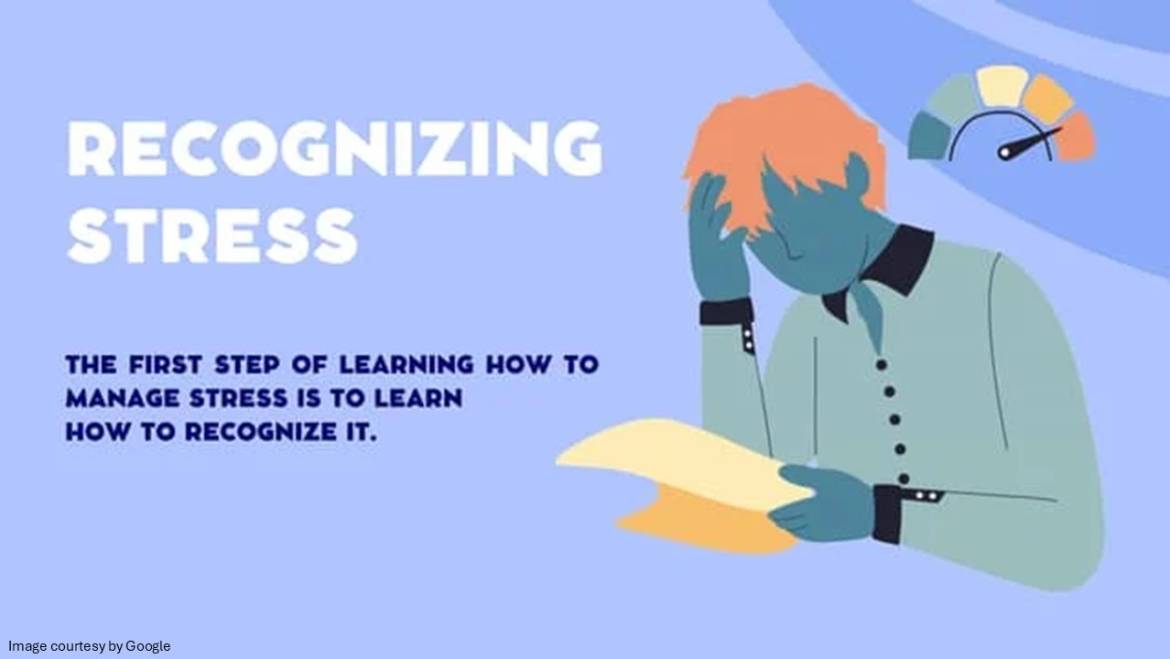The initial step in managing stress is recognizing its presence, but the question remains: how to recognize stress?
Everyone feels stress differently. Figure out your signs of stress, and once you know what signals to look for, you can start with stress management. Also, recognize the situations that make you stressed. These are called stressors. Your stressors could be family issues, work, relationships, money, or health problems.
Why is it important to recognize early signs of stress?
Once you understand what is causing you stress, dealing with it becomes more manageable, and the earlier you identify the cause, the sooner you will be able to get rid of it.
Avoid unhealthy stress relief.
Your stress may worsen if you resort to unhealthy habits to calm down. These may include:
-
- Eating excessively
- Smoking cigarettes and tobacco
- Drinking alcohol or using drugs
- Sleeping too much or too little
These behaviours may help you feel better initially, but they may do more harm than benefit. Instead, you can use the stress management techniques below to bust your stress.
How to manage stress?
Managing stress can be easy if you give it the attention it needs to get out of it.
Healthy stress busters – Try a few of the following stress management techniques and witness which ones work the best for you.
-
- Set priorities – Time management is essential. Create a to-do list, marking what is important to get done today and what can be left for another day. This helps you learn about your priorities, so you don’t have to stress about remembering what you should be doing.
- Avoid stressful situations -Whenever possible, distance yourself from the cause of stress.
- Practice facing stressful situations – Think about the situations you expect to face in the coming day and rehearse your reaction. Find ways to recognize stress and manage it. If you think speaking in front of a whole group frightens you, start practising it, perhaps with a loved one or a close friend. If the pressure of giving tests and interviews freezes you up, consider buying some test papers to practice solving them, or try practising interviews with your family members or friends.
- Get enough sleep – A good night’s sleep can help you achieve a clear vision, think more clearly, and have more energy. Sleep for about 7 to 9 hours each night.
- Live a healthy life – Drink plenty of water. Do exercise and eat a balanced diet. Eating healthy helps fuel your body and mind. Avoid high-sugar snack foods and focus on adding more vegetables, fruits, whole grains, low-fat or non-fat dairy, and lean proteins to your diet.
- Exercise – Engaging in daily physical activities is one of the easiest and most effective methods to boost your body and deal with stress. Exercise helps to stimulate your brain to release chemicals that make you feel good. It also helps you release the built-up energy or frustration. Find something you enjoy, such as walking, cycling, softball, swimming, or dancing, and commit to doing it for at least 30 minutes on most days of the week for several weeks.
- Rest and Relax – Give your body some rest and practice relaxation techniques that work best for you. These may include yoga, prayer, meditation, or breathing exercises. Practising relaxation techniques is a wonderful way of dealing with stress as they help slow your heart rate and reduce your blood pressure.
- Recognize the things you can’t change – Accepting that certain things are beyond your control and can’t be changed helps you let go and avoid spoiling your mood. Moreover, nothing stays the same for long. Develop a support system of relatives, friends, and loved ones to whom you can talk whenever needed. Never underestimate your inner consciousness; believe in yourself and your potential. Remember, so many people from disadvantaged backgrounds have achieved great success in their lives.
- Engage in activities you enjoy – When stress makes you feel low, do something you enjoy to lift your spirits. It could be as simple as reading a good book, watching a favourite movie, listening to music, or having dinner with a friend. Or engage in a new hobby or class. Whatever you decide to go for, just practice it regularly.
- Change your outlook: Try to build up a more positive outlook towards life’s challenges by replacing negative thoughts with positive ones.
- Let your feelings out: Write, talk, laugh, cry, and express anger when you need to. Talking with friends, family, a counsellor, therapist, colleague, or a member of the clergy about your feelings helps in stress management.

At the same time, avoid activities that claim to release your stress while adding to it. Consuming alcohol, caffeine, using marijuana and overeating, all these activities will only increase your body’s stress in addition to their adverse effects.
Here are some other stress management techniques:
-
- Set aside time for breaks in your daily routine, plan vacations, pursue your hobbies, and enjoy other fun activities.
- Arrange timings for tasks that require your complete attention. Accordingly, arrange some leisure time during which you can perform activities you really enjoy.
- After attending your back-to-back appointments or meetings, allow your body to catch its breath. Please take a few deep breaths whenever stress is on its way. Breathe from your abdomen and feel calm by saying to yourself, “I feel calm”.
- Learn to say no and prioritize your time. Setting limits can minimize stress. Do not allow other people to dictate how you spend your time.
Also Read: HOW TO MANAGE STRESS
Resources
If you are unable to manage stress on your own, you may want to discuss it with your health care provider. Or consider seeing a therapist or counsellor who can teach you how to manage stress and how to deal with it. Depending on the cause of your stress, you may also find it helpful to join a support group.
Conclusion:
Removal of stress is unrealistic since stress is a part of normal life. Everyone experiences stress in their lives; however, knowing effective stress management techniques is crucial for gaining control over our stress and its impact on our physical and mental health. If you are unable to manage stress, seek help from clinical experts to cope with it.



